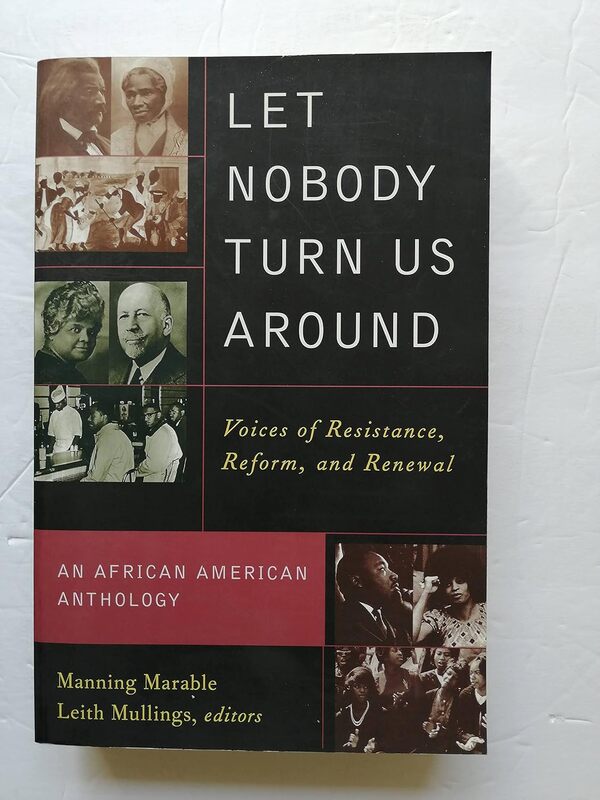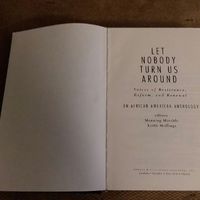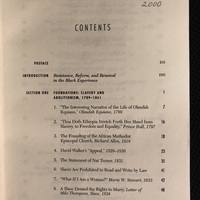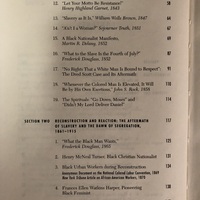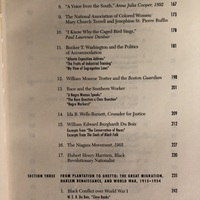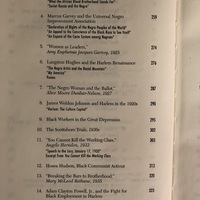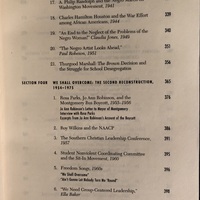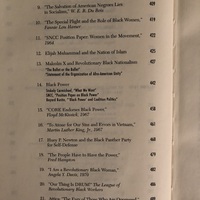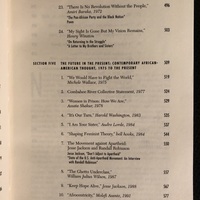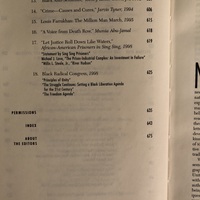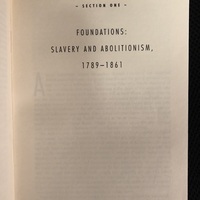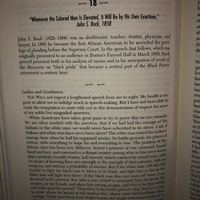-
Title
-
Let Nobody Turn Us Around: Voices of Resistance, Reform, and Renewal: An African American Anthology
-
This edition
-
"Let Nobody Turn Us Around: Voices of Resistance, Reform, and Renewal: An African American Anthology" . Ed. Manning Marable and Leith Mullings. Lanham, MD: Rowman & Littlefield, 2000. xxv+674 pp.
-
Table of contents
-
[Items that were dropped in the second edition (2009) are marked with an asterisk inside parentheses (*). Some new items were also added in that edition.]
● Preface / Manning Marable and Leith Mullings
● Introduction
Section One: Foundations: Slavery and Abolitionism, 1789-1861
● Olaudah Equiano / “The Interesting Narrative of the Life of Olaudah Equiano” (1789)
● Prince Hall / “Thus Doth Ethiopia Stretch Forth Her Hand from Slavery, to Freedom and Equality” (1797)
● Richard Allen / The Founding of the African Methodist Episcopal Church (1816)
● David Walker / David Walker’s “Appeal” (1829-1830)
● The Statement of Nat Turner (1831)
● Slaves Are Prohibited to Read and Write by Law
● Maria W. Stewart / “What If I Am a Woman?” (1833)
● A Slave Denied the Rights to Marry (Letter of Milo Thompson, Slave) (1834)
● The Selling of Slaves (Advertisement) (1835)
● Solomon Northrup / Solomon Northrup Describes a New Orleans Slave Auction (1841)
● Cinque and the Amistad Revolt (1841)
● Henry Highland Garnet / “Let Your Motto Be Resistance!” (1843)
● William Wells Brown / “Slavery as It Is” (1847)
● Sojourner Truth / “A’n’t I a Woman?” (1851)
● Martin R. Delany / A Black Nationalist Manifesto (1852)
● Frederick Douglass / “What to the Slave Is the Fourth of July?” (1852)
● “No Rights That a White Man Is Bound to Respect”: The Dred Scott Case and Its Aftermath
● John S. Rock / “Whenever the Colored Man Is Elevated, It Will Be by His Own Exertions” (1858)
● The Spirituals / “Go Down, Moses”
● The Spirituals / “Didn’t My Lord Deliver Daniel”
Section Two: Reconstruction and Reaction: The Aftermath of Slavery and the Dawn of Segregation, 1861-1915
● Frederick Douglass / “What the Black Man Wants” (1865)
● Henry McNeal Turner, Black Christian Nationalist
● Black Urban Workers during Reconstruction / Anonymous Document on the National Colored Labor Convention (1869)
● Black Urban Workers during Reconstruction / New York Tribune Article on African-American Workers (1870)
● Frances Ellen Watkins Harper, Pioneering Black Feminist (*)
● T. Thomas Fortune / “Labor and Capital Are in Deadly Conflict” (1886)
● Edward Wilmot Blyden / Edward Wilmot Blyden and the African Diaspora
● Alexander Crummell / “The Democratic Idea Is Humanity” (1888)
● Anna Julia Cooper / “A Voice from the South” (1892)
● Mary Church Terrell and Josephine St. Pierre Ruffin / The National Association of Colored Women: Mary Church Terrell and Josephine St. Pierre Ruffin
● Paul Lawrence Dunbar / “I Know Why the Caged Bird Sings”
● Booker T. Washington / Booker T. Washington and the Politics of Accommodation: “Atlanta Exposition Address”
● Booker T. Washington / Booker T. Washington and the Politics of Accommodation: “The Fruits of Industrial Training” (*)
● Booker T. Washington / Booker T. Washington and the Politics of Accommodation: “My View of Segregation Laws”
● William Monroe Trotter / William Monroe Trotter and the Boston Guardian
● Anon. / Race and the Southern Worker: “A Negro Woman Speaks”
● Anon. / Race and the Southern Worker: “The Race Question a Class Question”
● Anon. / Race and the Southern Worker: “Negro Workers!”
● Ida B. Wells-Barnett, Crusader for Justice
● William Edward Burghardt Du Bois / Excerpts from “The Conversation of Races”
● William Edward Burghardt Du Bois / Excerpts from The Souls of Black Folk
● The Niagara Movement (1905)
● Hubert Henry Harrison, Black Revolutionary Nationalist
Section Three: From Plantation to Ghetto: The Great Migration, Harlem Renaissance, and World War, 1915-1954
● W.E.B. Du Bois / Black Conflict over World War I: “Close Ranks”
● Hubert H. Harrison / Black Conflict over World War I: “The Descent of Du Bois”
● W.E.B. Du Bois / Black Conflict over World War I: “Returning Soldiers”
● Claude McKay / “If We Must Die” (1919)
● Cyril V. Briggs / Black Bolsheviks: Cyril V. Briggs and Claude McKay: “What the African Blood Brotherhood Stands For”
Claude McKay / Black Bolsheviks: Cyril V. Briggs and Claude McKay: “Soviet Russia and the Negro”
● Marcus Garvey / Marcus Garvey and the Universal Negro Improvement Association: “Declaration of Rights of the Negro Peoples of the World”
● Marcus Garvey / Marcus Garvey and the Universal Negro Improvement Association: “An Appeal to the Conscience of the Black Race to See Itself”
● Marcus Garvey / Marcus Garvey and the Universal Negro Improvement Association: “An Exposé of the Caste System among Negroes” (*)
● Amy Euphemia Jacques Garvey / “Women as Leaders” (1925)
● Langston Hughes / Langston Hughes and the Harlem Renaissance: “The Negro Artists and the Racial Mountain”
● Langston Hughes / Langston Hughes and the Harlem Renaissance: “My America”
● Langston Hughes / Langston Hughes and the Harlem Renaissance: Poems
● Alice Moore Dunbar-Nelson / “The Negro Woman and the Ballot” (1927)
● James Weldon Johnson / James Weldon Johnson and Harlem in the 1920s: “Harlem: The Culture Capital”
● Black Workers in the Great Depression
● The Scottsboro Trials, 1930s
● Angelo Herndon / “You Cannot Kill the Working Class,” 1933: “Speech to the Jury, January 17, 1933”
● Angelo Herndon / “You Cannot Kill the Working Class,” 1933: Excerpt from You Cannot Kill the Working Class
● Hosea Hudson, Black Communist Activist
● Mary McLeod Bethune / “Breaking the Bars to Brotherhood” (1935)
● Adam Clayton Powell, Jr. / Adam Clayton Powell, Jr., and the Fight for Black Employment in Harlem
● Elaine Ellis / Black Women Workers during the Great Depression: “Women of the Cotton Fields”
● Naomi Ward / Black Women Workers during the Great Depression: “I Am a Domestic”
● Southern Negro Youth Conference (1939)
● A. Philip Randolph / A. Philip Randolph and the Negro March on the Washington Movement, (1941)
● Charles Hamilton Houston / Charles Hamilton Houston and the War Effort among African Americans (1941)
● Claudia Jones / “An End to the Neglect of the Problems of the Negro Woman!” (1949)
● Paul Robeson / “The Negro Artist Looks Ahead” (1951)
● Thurgood Marshall / Thurgood Marshall: The Brown Decision and the Struggle for School Desegregation
Section Four: We Shall Overcome: The Second Reconstruction, 1954-1975
● Jo Ann Robinson / Rosa Parks, Jo Ann Robinson, and the Montgomery Bus Boycott, 1955-1956: Jo Ann Robinson’s Letter to the Mayor of Montgomery
● Anon. / Rosa Parks, Jo Ann Robinson, and the Montgomery Bus Boycott, 1955-1956: Interview with Rosa Parks
● Jo Ann Robinson / Rosa Parks, Jo Ann Robinson, and the Montgomery Bus Boycott, 1955-1956: Excerpts from Jo Ann Robinson’s Account of the Boycott
● Roy Wilkins / Roy Wilkins and the NAACP
● The Southern Christian Leadership Conference (1957)
● Student Nonviolent Coordinating Committee and the Sit-In Movement (1960)
● Freedom Songs, 1960: “We Shall Overcome”
● Freedom Songs, 1960: “Ain’t Gonna Let Nobody Turn Me ‘Round”
● Ella Baker / “We Need Group-Centered Leadership”
● Martin Luther King, Jr. / Martin Luther King, Jr., and Nonviolence: Excerpt from “Nonviolence and Racial Justice” (1957)
● Martin Luther King, Jr. / Martin Luther King, Jr., and Nonviolence: “I Have a Dream” (1963)
● John R. Lewis / “The Revolution Is at Hand” (1963)
● W.E.B. Du Bois / “The Salvation of American Negroes Lies in Socialism”
● Fannie Lou Hamer / “The Special Plight and the Role of the Black Woman”
● “SNCC Position Paper: Women in the Movement” (1964)
● Elijah Muhammad / Elijah Muhammad and the Nation of Islam
● Malcolm X / Malcolm X and Revolutionary Black Nationalism: “The Ballot or the Bullet”
● Malcolm X / Malcolm X and Revolutionary Black Nationalism: “Statement of the Organization of Afro-American Unity”
● Stokely Carmichael / Black Power: “What We Want”
● Black Power: SNCC, “Position Paper on Black Power”
● Bayard Rustin / Black Power: “‘Black Power’ and Coalition Politics”
● Floyd McKissick / “CORE Endorses Black Power” (1967)
● Martin Luther King, Jr. / “To Atone for Our Sins and Errors in Vietnam” (1967)
● Huey P. Newton / Huey P. Newton and the Black Panther Party for Self-Defense
● Fred Hampton / “The People Have to Have the Power”
● Angela Y. Davis / “I Am Revolutionary Black Woman” (1970)
● “Our Thing Is DRUM!” (The League of Revolutionary Black Workers)
● Attica: “The Fury of Those Who Are Oppressed” (1971)
● The National Black Political Convention, Gary, Indiana (March 1972)
● Amiri Baraka / “There Is No Revolution Without the People”: “The Pan-African Party and the Black Nation” (1972)
● Amiri Baraka / “There Is No Revolution Without the People”: poem
● Henry Winston / “My Sight Is Gone But My Vision Remains”: “On Returning to the Struggle”
● Henry Winston / “My Sight Is Gone But My Vision Remains”: “A Letter to My Brothers and Sisters”
Section Five: The Future in the Present: Contemporary African-American Thought, 1975 to the Present
● Michele Wallace / “We Would Have to Fight the World” (1975) (*)
● Combahee River Collective Statement (1977)
● Assata Shakur / “Women in Prison: How We Are” (1978)
● Harold Washington / “It’s Our Turn” (1983)
● Audre Lorde / “I Am Your Sister” (1984)
● bell hooks / “Shaping Feminist Theory” (1984)
● Jesse Jackson / The Movement Against Apartheid: Jesse Jackson and Randall Robinson: “Don’t Adjust to Apartheid”
● Clarence Lusane and Randall Robinson / The Movement Against Apartheid: Jesse Jackson and Randall Robinson: “State of the U.S. Anti-Apartheid Movement: An Interview with Randall Robinson”
● William Julius Wilson / “The Ghetto Underclass” (1987) (*)
● Jesse Jackson / “Keep Hope Alive” (1988)
● Molefi Asante / “Afrocentricity” (1991)
● Barbara Ransby, Elsa Barkley Brown, and Deborah King / The Anita Hill—Clarence Thomas Controversy (1991): “African-American Women in Defense of Ourselves”
● June Jordan / The Anita Hill—Clarence Hill Controversy (1991): “Can I Get a Witness?”
● Cornel West / “Race Matters” (1991)
● Henry Louis Gates, Jr. / “Black Anti-Semitism” (1992)
● Jarvis Tyner / “Crime—Causes and Cures” (1994)
● Louis Farrakhan / Louis Farrakhan: The Million Man March (1995)
● Mumia Abu-Jamal / “A Voice from Death Row”
● “Let Justice Roll Down Like Waters,” (African-American Prisoners in Sing-Sing) (1998): “Statement by Sing Sing Prisoners”
● Michael J. Love / “Let Justice Roll Down Like Waters” (African-American Prisoners in Sing-Sing) (1998): “The Prison-Industrial Complex: An Investment in Failure”
● Willis L. Steele, Jr. / “Let Justice Roll Down Like Waters,” (African-American Prisoners in Sing-Sing) (1998): “River Hudson”
● Black Radical Congress (1998): “Principles of Unity”
● Black Radical Congress (1998): “The Struggle Continues: Setting a Black Liberation Agenda for the 21st Century”
● Black Radical Congress (1998): “The Freedom Agenda”
● Permissions
● Index
● About the Editors
-
About the anthology
-
● Edited by the husband and wife team of black studies scholar Manning Marable (1950-2011) and anthropologist Leith Mullings (1945-2020).
-
Publisher's description
-
● "This anthology of black writers traces the evolution of African-American perspectives throughout American history, from the early years of slavery to the end of the 20th century. The essays, manifestos, interviews, and documents assembled here, contextualized with critical commentaries from Marable and Mullings, introduce the reader to the character and important controversies of each period of black history. The selections represent a broad spectrum of ideology. Conservative, radical, nationalistic, and integrationist approaches can be found in almost every period, yet there have been striking shifts in the evolution of social thought and activism. The editors judiciously illustrate how both continuity and change affected the African-American community in terms of its internal divisions, class structure, migration, social problems, leadership, and protest movements. They also show how gender, spirituality, literature, music, and connections to Africa and the Caribbean played a prominent role in black life and history." There is also a companion study guide.
-
Reviews and notices of anthology
-
● Hall, Perry A. "The Coming of Age of African American Studies: An Important New Contribution." "CR: The New Centennial Review" 1.1 (2001): 297-311.
The greater level of institutionalization of African American Studies in academia is evident in "the development of exemplar programs that formalize distinct approaches and schools of thought that have arisen within the field," such as the Afrocentrist approach of Molefi Asante at Temple University (carrying on the legacy of Maulana Karenga) in contrast to what Hall characterizes as the "inclusionist/integrationist" framework of Henry Louis Gates, Jr. at Harvard University (297-98). The interplay "between integrationist/assimilationist tendencies on the one hand, and nationalist/separatist tendencies on the other . . . has always marked historical dialogue among black leaders and intellectuals" and both tendencies are well represented in this anthology (299). Alongside them, however, this anthology also includes texts reflecting "a third force in the field, 'transformationism,' which heretofore has not been extensively represented in public discourse concerning the African American studies discipline": originally influenced by Marxism, this tendency is represented by figures such as Michael Eric Dyson and the editors of this anthology (299-300).
"The materials are organized into historical periods that roughly coincide with the framework originally developed within the Marxist-influenced 'third force' in the black studies movement. The first section includes materials from the slave era; the second draws materials from the post-Emancipation nineteenth century—from the end of the Civil War to the time of World War I. The next section covers the period from the beginning of the Great Migration until the dawn of the Civil Rights Movement. The fourth section is comprised of materials from the Black Freedom Movement period, from the Montgomery Bus Boycott until the mid-1970s, and the fifth and last section bridges to the present. The editors provide an essay that introduces the anthology, along with essays that start each section. There are also short biographical or informational sketches for each set of items or documents within each section. In addition, there are short bibliographies following each selection that identify additional sources for background and further study" (300-01).
-
● Banner-Haley, Charles Pete. "Journal of Southern History" 68.2 (2002): 432-34.
"[T]his collection presents the African American experience as one of collective resistance, political struggle for reform, and renewal. In their introductory overview, Marable and Mullings state that three paradigms, 'integrationism,' black nationalism, and transformation ('a radical transformation of the United States based on a fundamental redistribution of resources') have dominated African American social thought (p. xx). Within this framework, Marable and Mullings are careful to attend to the race-class-gender matrix that has been central to social history for quite some time now. They also note that they have tried to present the 'full range of African American thought' (p. xxiv), although there were constraints ranging from copyright problems to the unwillingness of a black conservative economist to permit reproduction of his work" (433). In general, "the works of black conservatives then and now" are not in this anthology and "will have to be hunted down" if teachers want to expose their students to the full range of views (433).
"Ultimately, the purpose of this book, the editors state, 'is not to assess social and political movements but rather to present the theories that informed them' (p. xxiv). This is fair enough. But the central problem with this otherwise useful collection of primary source materials is the lack of explanatory historical context. The head notes to the documents are woefully lacking in context and perspective despite the generally good introductory essays to the five sections that run from the first appearance of Africans in the Western Hemisphere through the present. For example, Langston Hughes's manifesto of the Harlem Renaissance, 'The Negro Artist and the Racial Mountain,' is reprinted here, but without mentioning that it was written in response to George S. Schuyler's essay 'The Negro-Art Hokum' (both originally appeared in the 'Nation' in 1926). Schuyler's piece should have been included with an explanation of his sojourn from being a progressive to a hard-right conservative" (433).
-
Commentary on anthology
-
● Neal, Anthony W. "Scholarly Books: An Authoritative Look at African and African American History." "The Bay State Banner" 7 Feb. 2012.
Neal refers, in passing, to this anthology as "the best black protest anthology."
-
The Bay State Banner
-
Item Number
-
A0341
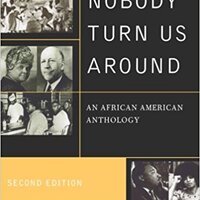 Let Nobody Turn Us Around: Voices of Resistance, Reform, and Renewal: An African American Anthology (2nd ed.)
Let Nobody Turn Us Around: Voices of Resistance, Reform, and Renewal: An African American Anthology (2nd ed.)
 Let Nobody Turn Us Around: Voices of Resistance, Reform, and Renewal: An African American Anthology (2nd ed.)
Let Nobody Turn Us Around: Voices of Resistance, Reform, and Renewal: An African American Anthology (2nd ed.)